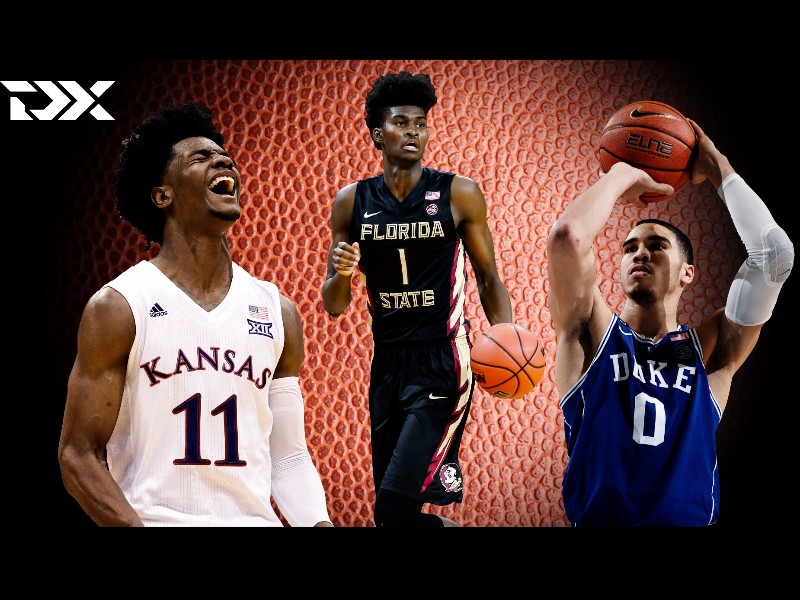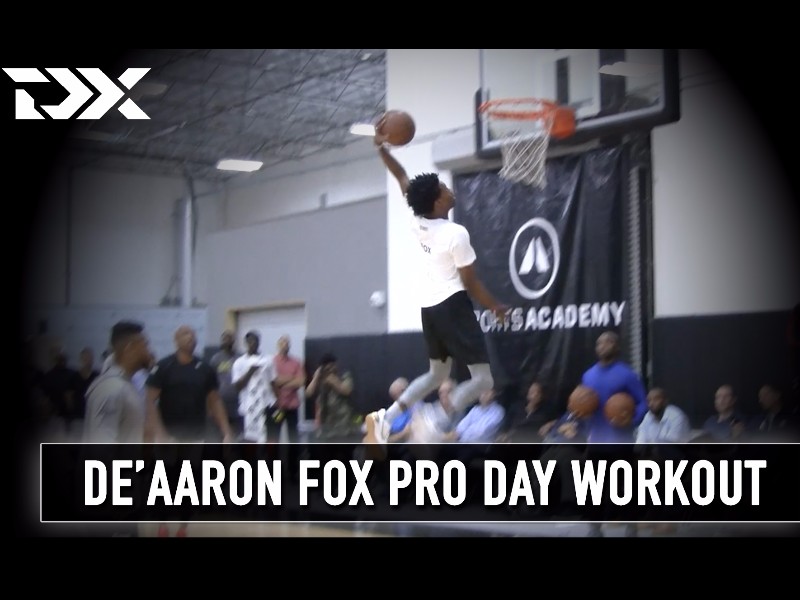Day Two
Day Three
Official Site/Boxscores
The 56th edition of the Portsmouth Invitational Tournament is in the books, and the very cohesive and talented Tidewater Sealants unsurprisingly came away as the champions in blowout fashion. At the end of the day, the tournament still ended up being a major success, despite the many pull-outs, as some of the replacements ended up having terrific outings. The gym was packed with NBA executives and GMs for the first three days, and everyone we spoke to was extremely positive when discussing the relevance of the tournament these days. At least 20 players from Portsmouth traditionally get invited to continue on to the Orlando Pre-Draft camp, so clearly there was still plenty to play for everyone in attendance, and with the amount of underclassmen that are expected to enter this draft, players who decided to pull out like Will Daniels, Russell Robinson, Darian Townes, Drew Neitzel and Marcelus Kemp may be applying for passports to play overseas sooner than they expected.
The MVP
Ohio States Jamar Butler was awarded MVP honors after helping his team win the championship and averaging 14 points, 3.3 assists and not even a lone turnover over the three game stretchalthough this decision was somewhat controversial in the eyes of some. Some felt that Pat Calathes was the deserving MVP, as his numbers were superior in virtually every category and he appeared to have played a more important role for his team over the course of the entire tournament. It should be noted that the MVP was decided by the organizers and the very few NBA people that were still in attendancemost of whom werent present for even half the gamesso its understandable that they were swayed by Butlers 18 point first half in the championship game which essentially sealed the deal for him and his team. In the future, it might make more sense to give the media members in attendance who had watched every single contest a vote as well.
Mark Tyndale was honored with the Allen Iverson Most Inspirational player award, while Reggie Williams was given the Sportsmanship award.
A-10 Represents
Looking back at the tournament, its pretty obvious that it was the Atlantic-10 seniors more than any other conference who really held down the fort and represented their conference better than anyone else. Nine playersPat Calathes, Gary Forbes, Josh Duncan, Mark Tyndale, Bryant Dunston, Stanley Burrell, Drew Lavender, Parfait Bitee and Brian Robertsparticipated, and all helped themselves to one degree or another with the way they played. Calathes, Duncan and Tyndale combined to form the nucleus of the championship team, and clearly set the tone for the rest of the group with the way they shared the ball unselfishly amongst themselves. The Atlantic-10 was obviously the real deal this season (Xavier made it to the Elite 8, UMass to the NIT Finals, Temple and St. Joes to the NCAA tournament) but teams are losing a great deal of talent which will be very difficult to replace.
All-Tournament Teams
Portsmouth came out with their own All-Tournament selections on their website today:
Josh Duncan Xavier
Pat Calathes Saint Joseph's
Kyle Hines UNC-Greensboro
Reggie Williams VMI
Gary Forbes UMASS
Deron Washington Virginia Tech
Othello Hunter Ohio State
Jiri Hubalek Iowa State
Chris Lofton Tennessee
Charron Fisher Niagara
JaJuan Smith Tennessee
Our own, slightly more NBA draft centric All-Tournament teams will be released one at a time over the next three days, starting tomorrow. The first team looks like this:
Jamar Butler
Mark Tyndale
Gary Forbes
Pat Calathes (MVP)
Kyle Hines
All-Disappointment Team
Jonathan Wallace
Derrick Low
Brian Laing
Kentrell Gransberry
Steven Hill
Final Day Recap:
After an average showing in the first two games, JaJuan Smith saved his best performance for last at the PIT. Smith nearly recorded a triple-double in Cherry, Berkaert & Hollands 94-80 win, registering 17 points, 10 rebounds and 7 assists. As was the case in his previous two games, Smith did the majority of his work from beyond the arc where he was 3-11 on Saturday. He shows a smooth stroke, able to connect in both spot up situations or off the dribble; however he does have a tendency to force tough shots and rush otherwise good looks from the perimeter. Smith was also able to knock down a pair of pull up jumpers from mid-range, and while he looked very fluid in these situations, his ball handling abilities need to improve in order for him to be anything more than a catch and shoot threat at a higher level of competition.
Smith did improve his rebounding and assist numbers in this final game. Despite being only 62, he has pretty good length and is very aggressive on the glass at both ends of the floor (4 of his 10 rebounds were offensive). Though he isnt a major threat to beat defenders off the dribble, Smith did do a solid job of getting into the lane and distributing the basketball to his teammates. As a 62 shooting guard with only average handles and explosiveness at best, it will be tough for Smith to break through to the professional level unless some considerable improvements are made.
Smith did improve his rebounding and assist numbers in this final game. Despite being only 62, he has pretty good length and is very aggressive on the glass at both ends of the floor (4 of his 10 rebounds were offensive). Though he isnt a major threat to beat defenders off the dribble, Smith did do a solid job of getting into the lane and distributing the basketball to his teammates. As a 62 shooting guard with only average handles and explosiveness at best, it will be tough for Smith to break through to the professional level unless some considerable improvements are made.
After spraining his ankle yesterday, Patrick Ewing Jr. sat out this game today, which is unfortunate because he was emerging as one of the more intriguing players here with his size, athleticism, motor, and high basketball IQ. Unlike some other players with injuries here, Ewing went to the game, sat on the bench with his team, and constantly encouraged his teammates, showing some nice character. It was also clear in looking at him that he was upset to miss out on another opportunity to play in front of scouts and executives, though he should be a shoo-in for Orlando.
Charles Rhodes also sat out this game, but didnt even show up to the arena, and no exact information was available as to why. Rhodes did okay for himself in the two games he played just by getting in front of scouts and executives and showing what he can do, even if he wasnt overly impressive in any one area. With his athleticism, motor, and interesting one-dribble face-up game from 10-15 feet, he was one of the more intriguing players here.
In the second game of the afternoon, Chris Lofton picked up right where he left off yesterday, showing the things hes capable of doing best, hitting extremely difficult jump shots. Lofton hit a variety of pull-up jumpers from inside and outside the arc, mostly fading away with a hand in his face, but also showed some nice shot fakes and the ability to get into the lane and finishing with finger rolls and floaters. Its interesting that Lofton didnt really adjust his shot selection at all in this setting, where he really didnt need to force as many contested, fade away jumpers, and it makes you question if he sees any line between what a good or bad shot is.
After starting off the tournament extremely well, Quan Prowell faded a bit down the stretch in his last outing, showing some of the inconsistency that plagued him throughout his college career. Hes still the same terrific athlete he always was, but his sloppy handle and tendency to settle for bad shots has become more apparent in the last two games. Defensively he relies too much on his athleticism as well, which isnt going to get the job done at the next level. Prowell has legit upside, and may still be intriguing enough to bring to Orlando for another look, but hes probably still 2-3 years away from being an impact player on the wing even in a high-level European league.
Othello Hunter played in two back to back games in the last day, replacing the injured Rob Kurz in the lineup the third game to give scouts another opportunity to evaluate him. His first was the more successful of the two, coming up with yet another double-double (his third straight) with 12 points (5-9 FG, 2-5 FT) and 13 rebounds. He showed his athleticism and ran the floor well again, getting out in transition as a trailer and finishing strong around the basket. He also made his presence felt on the offensive glass, showing a very quick second bounce and nice quickness to beat opposing players to the ball. Defensively he made plays two blocking shots and hedging screens nicely on the perimeter, but also bit for some pump-fakes and suffered from his lack of bulk being posted up inside. He looked completely gassed in his second game of the day and was understandably barely felt.
Jonte Flowers, a D2 Player from Winona State, is someone who has steadily performed well here in Portsmouth, showing some intrigue with decent athleticism, a nice, albeit streaky jump shot, and a propensity for impact plays on the defensive end. On defense, though, he cheats on his man more than anyone weve seen here, often going halfway across the court to try and pick off the ball from another opposing player. He shows similar tendencies in man-to-man defense, often sacrificing his position to take a swipe at the ball as his man drives by. To his credit, he shows excellent hands and timing, and makes some plays because of it, which also helps him on the boards, which he crashes very hard. On offense, his shot has some slight inconsistencies with his extension and follow through, and his arm can occasionally drift right, but he is capable of knocking down perimeter shots, with a smooth looking stroke. His dribble-drive game is decent, at least in this setting, though his handles arent particularly advanced. Flowers is an interesting guy, but because he doesnt especially stand out in any one area at this stage, hes probably not an NBA guy initially, though anything can happen a few years down the road.
Jonathan Wallace had a difficult tournament, looking unsure and overmatched outside of the Georgetown system. Despite being an average scorer and a lights out perimeter shooter during the season, Wallace didnt really show us either of these abilities. The majority of his looks came in spot up situations or coming off screens, but he never appeared to get comfortable with his shooting touch during his three games. While running the point, he showed good handles but lacked the quickness to beat his defender to the lane on a consistent basis. On occasion he did exhibit some nice floor vision, even dishing out 8 assists in his final game, but many of these were on basic drive and dish scenarios that didnt have a high degree of difficulty. The up and down tempo of this tournament didnt suit him very well at all.
In the third game, Frank Elegar put together a very nice stat-line, scoring 19 points on 7-for-10 shooting with 6 rebounds and a tournament-high 8 blocks. Elegar makes many emphatic plays over the course of every game, be it athletic dunks or blocks, though his focus doesnt always seem to be at 100%, as he can drift at times, and his reaction time doesnt always seem very sharp on both ends. All in all, though, with his athleticism, length (largest wingspan here), and the little flashes of post-up and face-up moves he shows, hes someone who has a chance to play in the NBA in the future, if he can make some noticeable strides with his skill development and learn how to maintain his focus for longer stretches.
On the same team, Gary Forbes had another strong showing, solidifying himself as likely the second best performer AND prospect in this tournament. There is not a great deal left to add from our two initial very in-depth reports (which can be read HERE and HERE), besides the fact that Forbes put a greater emphasis this time around on showing off his distribution skillswhich resulted in 13 assists (and 5 turnovers), to go along with just 3 points. He actually could have easily gotten to 16-17 assists or more even had his teammates finished better. Forbes combination of size, strength, savvy and skills made him an extremely versatile performer out on the wing, and the opposing team just did not have a defender capable of stopping him from doing as he pleased.
After his strong first day performance, Longar Longar really fell off in his last two games, having trouble catching passes with his poor hands and not showing the best coordination or balance, really failing to make a strong impact for his team. His reaction time also seemed to be a bit on the slow side. With his physical tools, he should have a chance at making the NBA in the future, but due to his advanced age for his class, many will question how much upside he has left.
Kentrell Gransberry was a disappointment this week, and even despite garnering a double-double with 13 points and 14 rebounds in his final game of the tournament, there were clearly some issues with the big mans game. Gransberry looked out of shape and at times struggled to keep up when the pace of play would pick up. He struggled in the post, showing very poor footwork and an underdeveloped back-to-the-basket game; the majority of his points during the three games came as a result of nice feeds inside by his teammates.
Perhaps most discouraging though was the body language we saw from Gransberry. Towards the end of his final game he looked to be pouting on the court and started to get very chippy with the opposition. Gransberry was tagged with an intentional foul and could have easily been hit with a second on a play where it appeared he threw Sundiata Gaines to the floor on a driving attempt. His terrific hands and timing for rebounds were on display in this last game, particularly on the offensive glass, but were beginning to wonder if that will be enough to carve out a spot for him in the league. He looked fairly underwhelming in person.
Perhaps most discouraging though was the body language we saw from Gransberry. Towards the end of his final game he looked to be pouting on the court and started to get very chippy with the opposition. Gransberry was tagged with an intentional foul and could have easily been hit with a second on a play where it appeared he threw Sundiata Gaines to the floor on a driving attempt. His terrific hands and timing for rebounds were on display in this last game, particularly on the offensive glass, but were beginning to wonder if that will be enough to carve out a spot for him in the league. He looked fairly underwhelming in person.
Deron Washington, one of the local favorites, had his best performance in his final game, scoring 21 points, including a surprising 4-5 shooting from beyond the arc, much higher than his regular season statistics would have you think he was capable of. This game really showcased Washingtons athleticism as he was given several opportunities in the open floor to make plays for his team. In the half court set he did show a quick first step but his lack of tremendous ball handling or savvy kept him from being more effective at taking defenders off the dribble. As was the case during the regular season he was inconsistent on the offensive end, making both impressive and poor plays when he had the ball. While there were flashes of ability at multiple points throughout the week, Washington confirmed what we already knew about him: he is a tremendous athlete with a poor basketball IQ and plenty of skill development needed. Defensively he gambled excessively and seemed to play with a reckless abandon that had to make those around him nervous, as his play frequently borders on dirty. Most concerning was his poor body language and the way he just didnt seem to fit in with anyone else on the team, not cheering his teammates on, and showing very little regard for making anyone except himself look good.
The final game of the evening, for the tournament championship, saw a drastic contrast in styles, with Rob McKivers team not ever getting much offensive flow going, primarily due to his ball-dominating style, as he doesnt have a point guards mentality, and is almost always looking for his own shot.
It was a tough week for Utah States Jaycee Carroll. The schools all-time leading scorer and arguably the top shooter in the country never really got his shot to drop in any of his three games. In his final game Carroll scored 9 points on 4-13 shooting while going 0-3 from the perimeter. There is no questioning that the former Aggie is a tremendous shooter, but Carroll struggled to get his shot off against bigger and faster players than he saw during the regular season. Finishing just 1-9 on the week. Despite possessing decent ball-handling skills, he simply wasnt quick enough to create a lot of good shot opportunities for himself at the rim and was forced to rely on difficult floaters and runners in the paint, which did not appear to be his forte. Even when he had open looks though, something just wasnt clicking for him, as he often left his shots short.
Carroll spent the majority of his time running the point for his team, and while he didnt do a poor job, he is clearly more used to playing off the ball. Utah State would run Carroll off a lot of screens to free him up for outside shots, and while that did happen on occasion for him at Portsmouth, he was forced to create his own shot more often than not. An extremely intelligent player with a very high skill level regardless of what we saw in this tournament, Carroll is still a superb shooter regardless of what the stats this week might indicate.
Carroll spent the majority of his time running the point for his team, and while he didnt do a poor job, he is clearly more used to playing off the ball. Utah State would run Carroll off a lot of screens to free him up for outside shots, and while that did happen on occasion for him at Portsmouth, he was forced to create his own shot more often than not. An extremely intelligent player with a very high skill level regardless of what we saw in this tournament, Carroll is still a superb shooter regardless of what the stats this week might indicate.
Kyle Hines put together another very efficient performance in a losing effort in the PIT Championship. Hines scored 16 points on 8-9 shooting, grabbed 7 rebounds, dished out 3 assists and had 3 blocks. He didnt show a whole lot as far as his perimeter skills as a scorer, picking up the majority of his baskets on sheer hustle plays in the paint. There is no denying his strength and athleticism, but against taller competition Hines tended to rely on his physical abilities and basketball IQ rather than his post moves when he was inside. As has been the case, Hines made a few impressive blocks as a help defender, showing his great knack for disrupting the offense whenever he is in the area. Of note, was the fact that he was once again assigned to cover a variety of opponents, including Josh Duncan in the paint and Pat Calathes on the perimeter, performing solidly against both players.
On the other end, you had an extremely unselfish and well-built teams, one of the more dominant teams weve ever seen here at Portsmouth, that spread out their assists very well, seeing five players here with 3+ assists, including one with 8 and one with 4. This team, led by Pat Calathes, Mark Tyndale, and Jamar Butler, won the game very easily, by a final margin of 23.
Pat Calathes was solid once again, with 14 points and 7 rebounds on 5-9 shooting, but didnt seem to have too much of a problem sharing the spotlight and letting his teammates step up in the championship game. The fact that this game quickly became a blowout obviously contributed to that. He helped set the tone for his extremely unselfish team by contributing to their outstanding ball-movement and making others better. He still managed to show his talent with some nice drives and finishes around the hoop, a few mid-range jumpers, and also continued to give the impression that he is a lot more athletic than he looks by slashing to the basket on one play and being fouled hard a moment before he tomahawk jammed the ball through the net. Defensively he looked better, funneling players into his help defense intelligently, and playing smart basketball as always. All in all he did a great job at this tournament and helped himself as much as anyone.
Reggie Williams was extremely aggressive trying to find holes in the defense to get his shot off, particularly when this game was mostly a blowout in the second halffinishing with 22 points on 9-15 shooting. He is clearly an intelligent player with outstanding scoring instincts, able to hit shots or move off the ball and make his way to the rack. For someone who was the #1 scorer in the country, its surprising to see how good of a passer he is. He looked throughout the camp like a team player who lets things come to him. His average ball-handling skills, lateral movement and overall quickness may hold him back in the long-term, but he should have earned himself a trip to the pre-draft camp with the way he played here.
The Allen Iverson Most Inspiring Player Award, which went to the Dallas Mavericks Jose Juan Barea two years ago, here went to Mark Tyndale of Temple, which we feel was perfectly fitting. Tyndale played the game with a constant energy on both ends of the court, showed exceptional talent on the defensive end with his athleticism, length, and fundamentally sound game, and also played very well on the offensive end, showing flashes of point forward ability along with solid handling and great court vision. With his play here, Tyndale probably changed our opinion of him more than any other player, and is someone who definitely got noticed, as he made more impact plays than anyone over the entire camp.
With 18 points and 5 assists in the final game, mostly done in the first half, Jamar Butler won the MVP award for the tournament. Butler shot the ball great, as hes done throughout his college career, and he did a good job facilitating his teams offense, which was extremely smooth in all three games. Butler pleasantly surprised us here, though thats something well touch on more in our final recap of the tournament in the coming days.

























































Comments